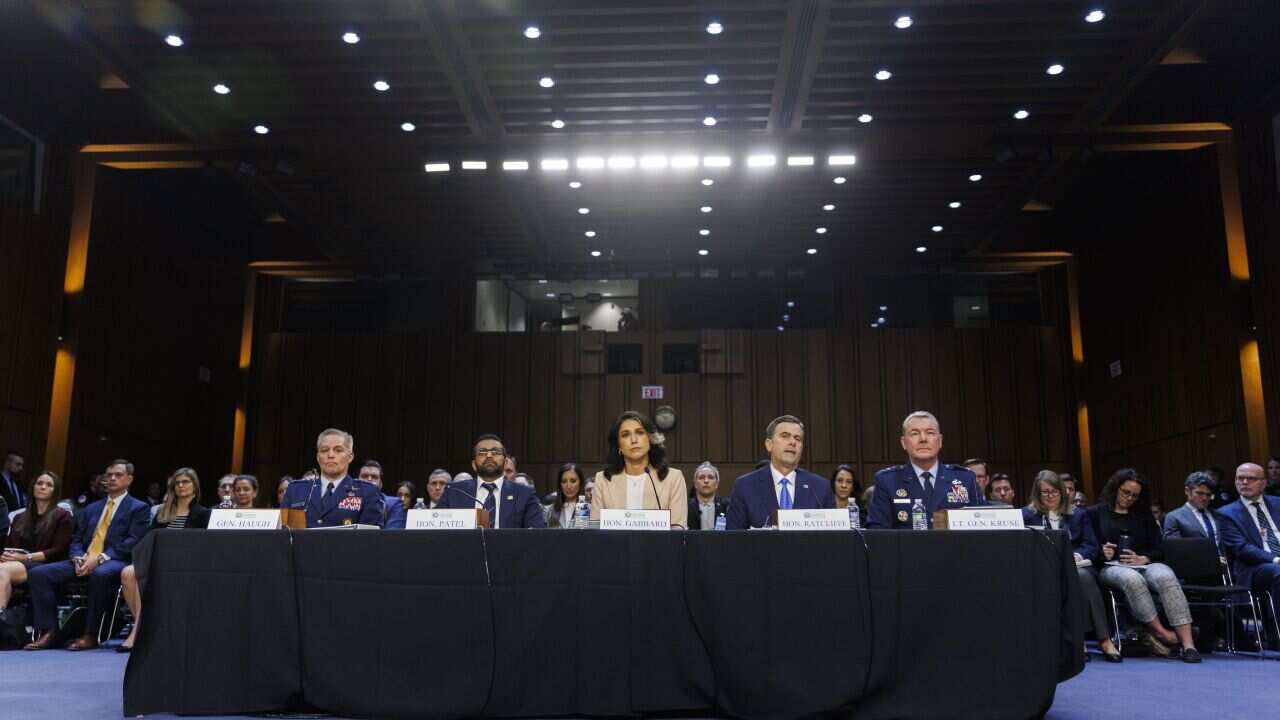Key Points
- Democrats call on top US officials to resign after leaked group chat
- Top national security officials testified before a Senate Intelligence Committee
- Security officials deny group chat contained war plans or classified material
United States President Donald Trump’s administration has sought to minimise the fallout after a magazine journalist disclosed he had been inadvertently included in a secret group discussion of highly sensitive war plans, while Democrats called on top officials to resign over the security incident.
Director of National Intelligence Tulsi Gabbard and CIA director John Ratcliffe — both in the chat — testified before the Senate Intelligence Committee that no classified material was shared.
But Democratic senators voiced scepticism about that claim, noting that the journalist, The Atlantic editor-in-chief Jeffrey Goldberg, reported that Defense Secretary Pete Hegseth posted operational details about pending strikes against Yemen’s Houthi militants “including information about targets, weapons the US would be deploying and attack sequencing”.
“It’s hard for me to believe that targets and timing and weapons would not have been classified,” Senator Angus King, an independent who caucuses with Democrats, said at the contentious hearing which featured several sharp exchanges.
“I am of the view that there ought to be resignations, starting with the national security adviser and the secretary of defense,” Democratic Senator Ron Wyden said at the hearing, echoing calls from several other lawmakers in his party.
Democratic Senator Jon Ossoff appeared to grow frustrated after Ratcliffe answered “I don’t recall” to a series of questions about the content of the Signal chat.
“Director Ratcliffe, surely you prepared for this hearing today,” Ossoff said.
“You are part of a group of principals, senior echelons of the US government, and now a widely publicised breach of sensitive information.”
“We will get the full transcript of this chain, and your testimony will be measured carefully against its content,” he added.
Republican representative Don Bacon, a retired Air Force general who sits on the House Armed Services Committee, told reporters that Hegseth needed to take responsibility for the breach, which he said put lives at risk. Source: AAP / Aaron Schwartz
A former US official told the Reuters news agency that operational details for military actions are typically classified and known to only a few people at the Pentagon.
Such top-secret information is usually kept on computers that use a separate network, the official said.
Earlier on Tuesday, Trump expressed support for his national security adviser, Michael Waltz, who had mistakenly added Goldberg to the Signal discussion.
“Michael Waltz has learned a lesson, and he’s a good man,” Trump told NBC News in a phone interview.
National Security Council spokesman Brian Hughes said on Monday that the chat group appeared to be authentic.
Classified and sensitive information is not supposed to be shared on commercial mobile phone apps, and unknown numbers – such as Goldberg’s – should not be included.
Accounts that appeared to represent Vice President JD Vance, US Secretary of State Marco Rubio, Ratcliffe, Gabbard, Treasury Secretary Scott Bessent, White House chief of staff Susie Wiles and senior National Security Council officials were assembled in the chat group, Goldberg wrote on Monday.
White House press secretary Karoline Leavitt accused Goldberg of sensationalising the story in a post on X and asserted that no war plans were discussed and no classified material was sent to the thread.
Goldberg did not include the planning details that he said Hegseth had posted in the chat but he termed it “shockingly reckless”.
It remained unclear why the officials chose to chat via Signal rather than the secure government channels typically used for sensitive discussions.

